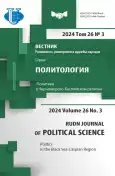Влияние «крымского фактора» на геополитические процессы в Черноморском регионе
- Авторы: Ишин А.В.1
-
Учреждения:
- Крымский федеральный университет им. В.И. Вернадского
- Выпуск: Том 26, № 3 (2024): Политика в Черноморско-Каспийском регионе
- Страницы: 556-568
- Раздел: ГЕОПОЛИТИКА ЧЕРНОМОРСКОГО РЕГИОНА
- URL: https://journal-vniispk.ru/2313-1438/article/view/322423
- DOI: https://doi.org/10.22363/2313-1438-2024-26-3-556-568
- EDN: https://elibrary.ru/ANUUXK
- ID: 322423
Цитировать
Полный текст
Аннотация
На основе структурно-функционального, кросс-культурного анализа и метода бинарных оппозиций рассматривается влияние «крымского фактора» на геополитические процессы в Черноморском регионе. Исследование сосредоточено на факторе геополитического прессинга со стороны коллективного Запада, поликультурной специфики Крымского полуострова как фактора геополитики. Автор приходит к выводу о высокой значимости военно-стратегической, геоэкономической, социокультурной роли Крыма в политических процессах. Итоги «Крымской весны» 2014 г. во многом изменили расстановку сил в Северном Причерноморье, послужили новой точкой отсчета в геополитической динамике. При этом Крым с большой долей вероятности может сыграть важную роль в формировании новой геополитической идеологии России, необходимой на современном этапе развития.
Об авторах
Андрей Вячеславович Ишин
Крымский федеральный университет им. В.И. Вернадского
Автор, ответственный за переписку.
Email: a.ischin@yandex.ru
ORCID iD: 0000-0001-6513-4198
доктор исторических наук, профессор кафедры истории России, Институт «Таврическая академия»
Симферополь, Российская ФедерацияСписок литературы
- Anchev, S.I. (2023). Black Sea region in contemporary US plans against Russia. In V.V. Kasyanov & A.V. Baranov (Eds.), Black Sea-Mediterranean Region in the Russian National Security
- System: on the 240th Anniversary of the Accession of Crimea and Kuban to Russia and the
- th Anniversary of the Liberation of Krasnodar Krai from Nazi Invaders: proceedings of the International Scientific and Practical Conference (pp. 479–485). Krasnodar: Kuban State University (In Russian).
- Baranov, A.V. (2023). Integration of Crimea and Novorossia into Russia: history and modernity. In V.V. Kasyanov & A.V. Baranov (Eds.), Black Sea-Mediterranean Region in the Russian
- National Security System: on the 240th Anniversary of the Accession of Crimea and Kuban to Russia and the 80th Anniversary of the Liberation of Krasnodar Krai from Nazi Invaders: proceedings of the International Scientific and Practical Conference (pp. 15–20). Krasnodar: Kuban State University. (In Russian).
- Danilevsky, N.Ya. (1991). Russia and Europe. Moscow: Kniga. (In Russian).
- Grinevetskiy, S.R., Zhiltsov, S.S., & Zonn, I.S. (2007). Black Sea Knot. Moscow: International Relations. (In Russian).
- Grinevetskiy, S.R., Zhiltsov, S.S., & Zonn, I.S. (2009). Danube Encyclopedia. Vol. 2. Moscow: International Relations. (In Russian).
- Grinevetskiy, S.R., Zhiltsov, S.S., & Zonn, I.S., & Kosarev, A.N., & Kostyanoi, A.G. (2015). The Black Sea Encyclopedia. Berlin: Springer.
- Ishin, A.V. (2014). The reunification of Crimea with Russia: The geocultural dimension. PostSoviet Issues, 2(2), 163–172. (In Russian).
- Ishin, A.V. (2016). Multilateral cooperation in the Black Sea region in the energy field. In The Handbook of Environmental Chemistry (pp. 163–168). Berlin: Springer. https://doi.org/10.1007/698_2015_395
- Ishin, A.V. (2017). The Crimea in 1921–1941. The Journal of Education and Science Istoriya (History), S12, 13–13. (In Russian).
- Ishin, A.V. (2020). About Geopolitical Strategy of NATO in the Black Sea Pool. Post-Soviet Issues, 7(2), 219–226. (In Russian). https://doi.org/10.24975/2313-8920-2020-7-2-219-226
- Ivanchenko, Ya.A., & Muradov, G.L. (2023). International relations of the Republic of Crimea (2014–2022). Simferopol: Sonat. (In Russian).
- Konstantinov, V. (2024). Crimea and the Northern Black Sea region in the context of Russia’s national interests. The International Affairs, 4, 4–7. (In Russian).
- Kosarev, A.N., Kostianoy, A.G., Zonn, I.S., & Zhiltsov, S.S. (2014). The Caspian Sea and KaraBogaz-Gol Bay. In The Handbook of Environmental Chemistry (pp. 69–94). Berlin: Springer.
- Kraj, K.I. (2024). Ukrainian conflict: Soviet-Russian concepts of special operations. In V.V. Kasyanov & A.V. Baranov (Eds.), Black Sea-Mediterranean Region in the Russian
- National Security System: on the 240th Anniversary of the Accession of Crimea and Kuban to Russia and the 80th Anniversary of the Liberation of Krasnodar Krai from Nazi Invaders: proceedings of the International Scientific and Practical Conference (pp. 401–404). Krasnodar: Kuban State University. (In Russian).
- Popescu, R.-M. (2024). Comparative Analysis of the Russian and Romanian Approaches to Their Security in the Black Sea Region: Evolution and Constants. In V.V. Kasyanov & A.V. Baranov (Eds.), Black Sea-Mediterranean Region in the Russian National Security
- System: on the 240th Anniversary of the Accession of Crimea and Kuban to Russia and the 80th Anniversary of the Liberation of Krasnodar Krai from Nazi Invaders: proceedings of the International Scientific and Practical Conference (pp. 475–478). Krasnodar: Kuban State University. (In Russian).
- Shornikov, I.P. (2023). Western policy in the Moldovan-Transnistrian direction and security factors on the Dniester. Russian World at a Turning Point. Collection of Materials from the Plenary Sessions of the Livadia Club. Simferopol: Administration of the State Council of the Republic of Crimea, 139–143. (In Russian).
- Zhiltsov, S.S. (2014). Energy Flows in Central Asia and the Caspian Region: New opportunities and new Challenges. Central Asia and Caucasus, 4, 69–79.
- Zhiltsov, S.S., Malgin, A.V., Grigoryanc, V.E., Ishin, A.V., & Kiseleva, N.V. (2015). Ukraine: Problems of territorial-state development. Moscow: Publishing house VKN. (In Russian).
- Zhiltsov, S.S. (2016). Russia’s policy towards the pipeline transport in the Caspian Region: Results and prospects. The Handbook of Environmental Chemistry. Berlin: Springer, 85–94. http://doi.org/10.1007/698 2015 384.
- Zonn, I.S., Glantz, M., Kostianoy, A.G., & Kosarev, A.N. (2009). The Aral Sea Encyclopedia. Berlin: Springer.
- Zonn, I.S., Kostianoy, A.G., Kosarev, A.N., & Glantz, M. (2010). The Caspian Sea Encyclopedia. Berlin: Springer.
- Zonn, I.S., Kostianoy, A.G., & Semenov, A.V. (2016). The Eastern Arctic Seas Encyclopedia. Berlin: Springer.
- Zonn, I.S., Kostianoy, A.G., & Semenov, A.V. (2017). The Western Arctic Seas Encyclopedia. Berlin: Springer.
Дополнительные файлы









